Six Candidates To Battle It Out For Ballon d'Or Award
-
World Cup 2010 Comment: Six Candidates To Battle It Out For Ballon d'Or Award
Marcus Haydon describes how the final week of the World Cup may well determine the winner of the European Footballer of the Year title.
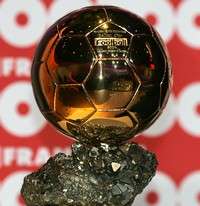 Ballon d'Or France Football
Ballon d'Or France Football
A glance back through the past winners of the Ballon d’Or highlights a clear pattern. Whenever a World Cup year comes around, the winner of the game’s most celebrated individual award is almost always, somewhat unsurprisingly, a significant figure at that year’s big tournament.
In 2006 the Italian captain Fabio Cannavaro was the winner, just months after leading his country to a World Cup triumph. In 2002 it was the Golden Boot winner Ronaldo that collected the award, having scored the winner in that year’s final. While 1998 saw Zinedine Zidane given the award for his sensational performance during that year’s World Cup in France. Lothar Matthaus took it in 1990, Paolo Rossi in 1982 and Johan Cruyff in 1974. The list goes on.
When this clear connection is combined with the absence of the world’s two most iconic footballers - Lionel Messi and Cristiano Ronaldo - in the final stages of this year’s tournament, an intriguingly open contest for the award appears to be being played out as a sub-text to the final stages of the competition in South Africa.
Wesley Sneijder
Inter & Netherlands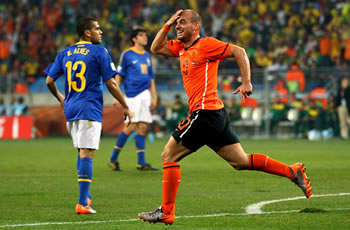
The huge recruitment drive that followed Florentino Perez’s re-election as Real Madrid president forced Sneijder out of the Santiago Bernabeu last summer. The Spanish giants may well be having second thoughts about that decision though, with Sneijder impressing hugely during Inter’s run to the Champions League title as well as at the World Cup in South Africa.
Tenacious and inventive, Sneijder broke into the Ajax team at a young age - impressing with his positive attitude and proficient technique. However, the diminutive playmaker really burst onto the scene in 2007 after signing for Real Madrid and then producing some superb displays for Netherlands at Euro 2008. Despite his small size, the midfielder’s robust frame and dogged approach has seen him cope comfortably with more combative opponents.
Arjen Robben
Bayern Munich & Netherlands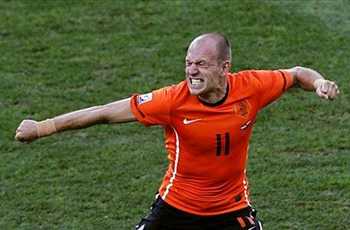
Another Real Madrid cast-off, Robben has flourished in Germany with Bayern Munich. Like his compatriot Sneijder, Robben performed well in Spain but was forced from the club after the signings of Critiano Ronaldo and Kaka. Blessed with electric acceleration and swift footwork, the winger produced sublime performances at club level to help Bayern to a domestic double and an appearance in the Champions League final.
Often employed as an ‘inside-out’ winger who cuts inside onto his stronger side to offer a goal threat, Robben has also shown his worth at international level, returning from injury to score against Slovakia and help his team past Brazil. Capable of turning a game on its head in an instant, the flying winger could prove key to Dutch success.
Diego Forlan
Atletico Madrid & Uruguay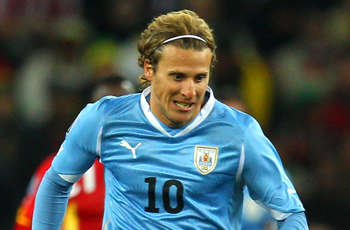
There are very few Manchester United fans who would have believed the transformation of the Uruguayan striker. Having taken eight months to claim his first goal in English football, Forlan only lasted two years at Old Trafford before leaving for Spain. However, since moving, the striker has matured into a forward of great quality and intelligence.
He’s won the Pichichi trophy twice in his six years in Spain and scored the winning goal in last season’s Europa League final to give Atletico Madrid their first European trophy since 1962. Wonderfully instinctive and stealthy in and around the penalty area, Forlan has claimed three goals so far at the World Cup and shown his versatility after being deployed in a deeper-lying attacking role.
Bastian Schweinsteiger
Bayern Munich & Germany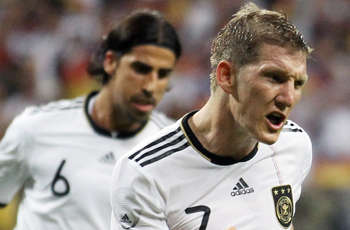
Having broken through into Bayern Munich’s first-team at just 18 years old, ‘Schweini’ seemed destined not to fulfill the potential some felt he had. However, after being moved into central midfield last season by Bayern coach Louis van Gaal, Bastian has be reborn. His assimilation into the role has been almost seamless and he played a vital role as the German side made it to the Champions League final.
Joachim Loew recognized the midfielder's progress and has adopted him in a similar role at international level - giving the side balance alongside Sami Khedira. His performances throughout the World Cup have been assured and he was outstanding against Argentina on Saturday. Or, as the Frankfurter Allgemeine Sonntagszeitung so eloquently labeled him: “the epicenter of the German game”.
David Villa
Barcelona & Spain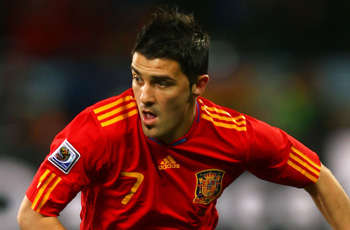
Despite the plentiful talent present in the Spanish squad, five goals from David Villa have dragged Vicente del Bosque’s men into the last four. La Furia Roja have struggled badly to ignite the World Cup with their unique fluency, but the Barcelona frontman has been involved in every one of their goals (scoring five and assisting the other one).
At club level he has earned a move to Barcelona following five years at Valencia in which he has scored in excess of 100 goals. His phenomenal technical ability has allowed him to bag a wide variety of goals and establish the proud Asturian as one of the most feared forwards in the world.
Xavi
Barcelona & Spain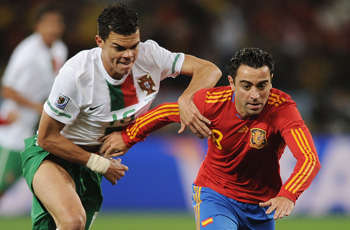
While Matt Lawton of the Daily Mail may be blind to the merits of Barcelona’s brilliant midfielder, the rest of the world certainly isn’t. The ingenious playmaker personifies the intuitive virtues of the Catalan giants, and is also a leader at international level. A natural in possession, every movement, pass and action is undertaken with an innate understanding of others’ positions and intentions. Xavi is the veiled assassin.
His work for Spain in South Africa has been troubled by the counter measures employed by a number of sides, suffocating the central areas in which he operates. Despite this, his quality remains a beacon in the team’s play, making more passes than anybody else in the tournament. He also helped Barcelona to a second successive title, despite the massive spending of Real Madrid, and will undoubtedly go down as one of the players of his generation. -
Europe and FIFA merge to announce one Player of the Year
Ballon d'Or will become the world’s most prestigious player of the year award from 2011 following an announcement that it is to merge with Fifa's world equivalent.
A deal has been reached that will see Europe's existing Ballon d'Or and Fifa's World Player of the Year award cease to exist as individual entities.
France Football publisher Marie-Odile Amaury and Fifa president Sepp Blatter have said that instead of separate prizes the honours will combine under the Ballon d'Or title which will be awarded every January from 2011.